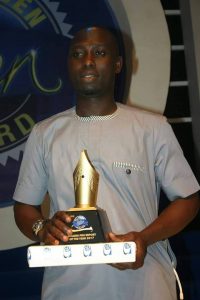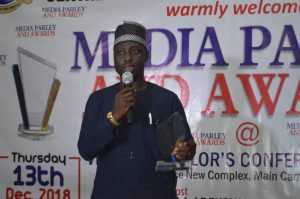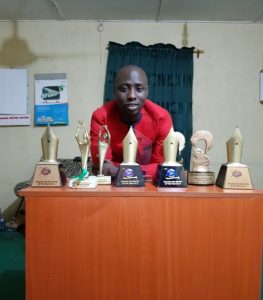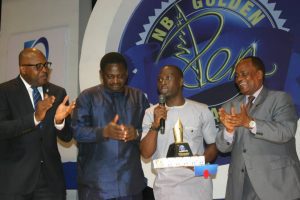Mojeed Alabi is one of the young and vibrant Muslims in the Nigerian media landscape. He has distinguished himself in both print and online journalism, and won over 9 awards in different categories, including the Wole Soyinka Prize for Investigative Reporting, all within a 9-year media career.
Shortly after his exclusive interview with frontpageng.com was released today, Monday, May 20, Muslim News sought him out to celebrate him and further asked him how being a Muslim has influenced his motivation to win awards as a journalist.
The elated Mojeed, who is an inspiration to many of his contemporaries and emerging journalists, gave all praises to Allah, adding that; “Islam as a religion preaches peace, justice and fairness. To achieve all these, journalists have roles to play by exposing fraud in both low and high places.
“Islam also preaches excellence and all I have done is to try to be an ideal model for my children. It takes the grace of God to excel but as a Muslim, I have tried to aspire to be a proud ambassador of the religion of Al-Islam.”
Read the first part of his interview with SAKIBU OLOKOJOBI of frontpageng.com, as republished by Muslim News:
You are a multiple awards winning journalist. How many awards have you harvested in the past few years?
First let me thank you for this honour. I have been in journalism for about nine years. I started my journalism career in 2010 with the National Mirror. So, I’m in my ninth year. I started as a reporter. If I may count, at least, I have got more than ten awards from competitions like NMMA (Nigeria Media Merit Award), Golden Pen, Wole Soyinka Award for Investigative Reporting and some others.
How did the award winning spree start?
I must give credit to the team that put up the editorial team together at National Mirror. I never had the mindset and never believed I could do it.
If I must digress a little, the experience I had when I was going for recruitment was very discouraging. One of the editors at the time told me that I was not competent, that I had never had any experience as a journalist. He said I could not be recruited. I felt very bad. I was told I did not have any newspaper cuttings, so, I was not qualified. Then, I had a book already written alongside my colleague.

When I finished school, I went into documentary and biography writing. I never had the mindset of seeking employment anywhere. So, we set out to write books. We were on the second or third one. It was a book about a community leader whom we knew had something to tell the public. He was a teacher and great men had undergone tutelage under him. He is still alive. He was a teacher and so many great men had undergone tutelage under him. Some of them are the Ogiyan of Ejigbo and the Oloko of Oko. He was the Secretary of the popular Oroki Social Club sang about in the past by Alhaji Haruna Ishola. This man was still alive and we wanted people to learn from his life. So we wrote a book on him.
But at the point of launching the book, the man suffered some challenges – he lost a child; another one that was ready to marry was involved in an accident. So, we put that off. Over that, I had already taken a loan of about N500,000. That money went down the drain. At that point, we just felt we needed to move on in life. That was the point when I considered going into journalism.
I must thank one or two persons who encouraged me – One Aunty Bola, who was the Secretary to the Managing Director then. She insisted I must come to National Mirror. I came for test, they said I passed, I came for interview and I also passed, but I was told I never had experience as a journalist and could not come in. I tried to publish in some other newspapers so that I could use, but it did not really work. I did a story on a blind man, took the photograph, submitted to The Nation. It took a long time before they could publish it. When it was published eventually, my name was miss-spelt.
I think it took Steve Ayorinde, the Daily Editor at the time to look at my file and I learnt he wondered why I was not employed. I was invited, I wrote another test. After the test, he asked me when I was going to join the newspaper, and I was shocked. I said resume? He said yes, that he had seen my script and he was satisfied. He asked what I would like to cover and I said Politics. He said apart from Politics what else, and I told him I would prefer Education. He said when did I want to resume and I told him as soon as he wanted me to.
I resumed on the 1st of November. I resumed on Politics desk, but Steve Ayorinde later told me to move to Education desk. He said he did that because he wanted me to have a good career. On the Education desk, I was fortunate to work with very fantastic people who knew how to mentor. They likes of Sam Eferaro, who was the head of the desk. Then, I met somebody who loved awards – Tubosun Ogundare. He came from Champion newspapers. His idea was, no matter how obscure your platform may be if you write quality stories, you can win awards. He had won NMMA, he had won DAME. He was one of those celebrated as award winners to start the National Mirror.
So, when we started working together, he told me, Mojeed, don’t worry, you will win awards. We continued to work together. Even stories that won awards, I didn’t know they could win awards. It took Steve Ayorinde, the Editor of the newspaper, who was searching for stories that could win awards to identify them. One day, he came to me and said, Mojeed, have you entered for some of these awards and I said no, I didn’t have stories that could go. He opened his file and asked: Who wrote this? Who wrote this? Who wrote this? (pointing to some of my stories as he flipped the pages of the newspapers). He shouted at me: Go and enter the stories for awards my friend! That was how I won my first NMMA awards. The story that won me the NMMA award of Education Reporter of the Year came about a year after I joined National Mirror. I think it was about setting agenda for the new OAU Vice Chancellor. That was when Professor Omole was to resume. We set agenda for him, the challenges and other things. That was what gave me the award in 2011.
There was one before that. Rotary Club, Ikeja. We won the best report in Education. We also won the runner up in the Health category for National Mirror. After that, we felt, oh, we could do better. That was how it all started.
What was your feeling when you won the first award?
The feeling was just that: Oh, somebody, somewhere is looking at what you are doing? What gave me joy more was that I won the award in my beat – Education. It is common to find somebody straying into it from another beat and winning awards. People who did not cover Education would come in and win award in the beat by writing quality stories. I was proud that it was my beat and I proved that I understood my beat and was rewarded for it. I felt very happy, particularly given the opportunity that it made me to meet people. I think it was presented by former Minister, Nike Akande. I was proud that I could mount the same rostrum with a a person of that caliber and I could have a handshake with her. That really gave me the motivation that if I did well, the reward would come.

To what extent did the initial push by your editors and others assist you? Did you take off from there or you still relied on them for further assistance?
If you have a good spirit, and you have people who, at least have shown you the way, what else do you need? After three years in National Mirror, I had a stint in Leadership newspapers. But when I joined New Telegraph, I had an ambition. It was to leave a mark. Not as a journalist alone, but to impact society, to positively affect society. I want a situation where, journalism is seen as the fourth estate of the realm, and it is seen as the job that has a constitutional backing. If that is so, how much can we use this to positively affect the society; to right the wrongs; to also know when things are going wrong. It is to also appreciate good things that are done. It should not always be negative, negative and negative stories in the media. There should also be room for appreciating the good things that people may have done.
When I joined New Telegraph in 2014, courtesy of the Managing Director, Mr. Bolaji Tunji, who was so proud of me. I can remember, he was telling the Editor then, Mr. Gabriel Akinadewo: Please, give this guy his letter, I cannot afford to lose him. When I heard what he said, I was like, “Who am I? What am I bringing on board?” I asked myself: How do I make this person proud. The only way I could do that was to show what I could do. So, when I got in, I was on the Education desk, and I felt I could still poke my nose into other sectors like Agric, Health and more. That was the basis of my ability to do big stories across other beats. I just wanted to do things that would affect lives positively. Even beyond the awards, there are fellowships that I won which I didn’t know I could win.
Something happened in the newsroom one day. I saw one of my colleagues in the newsroom, who went into the street and bought a drink – an alchoholic drink. People asked him if he bought it on the street and he said “Yes.” I was surprised. I wondered how they could be selling alcoholic drinks on the street and people could buy it in traffic; it means that something is wrong. Then, I wondered: Could the availability of such drinks have contributed to the increase in the rate of accident? I felt that was an interesting story idea I could pursue. That was all. I did my findings. Moved from one place to the other trying to find out who was responsible for what. I moved from NAFDAC, Advertising Practitioners of Nigeria… Federal Government does not have any agency to control where alcohol is sold.
Then, I learnt Lagos had a task force on child rights. I went on and on. Fortunately, a matter was brought to my notice, where a drunk female driver killed an entire family in Ibadan on January 1, 2015. Father, mother and a three years old child were killed. The woman was also pregnant. The whole family died. The entire family died because a woman was drunk. Inside the car, they saw bottles of alcohol in the vehicle of the woman that drove and killed them. Obviously, the woman had gone to enjoy, drinking alcohol in celebration of the new year.

I went through FRSC, finding the statistics of accidents recorded at certain period, and which one was linked to drink-driving. I wrote the material and never knew it would come handy. I saw an entry where WHO needed to have a road safety conference in Brazil. They needed fellowship for journalists across the world. I did not know I was going to meet the deadline. I applied on my phone, a Blackberry. They needed one per country and they chose about 27 countries. How I qualified, I did not know. When they released the list, I think it was a colleague in The Punch that saw it and drew my attention to it. I never knew that beyond plaques and certificates, I could also travel out of the country in an all expenses paid trip by WHO. I was in Brazil and had a good experience of road safety. I became an ambassador. From there, I learnt so much about road safety. I never covered motoring as a reporter, but was just interested in tackling the problem of accident caused by drink-driving. I was the only journalist in Nigeria that attended it and all over the world, we were 27. That gave me a sort of encouragement and I am happy about it. It gave me the motivation to pick on any topic and work on without targeting any award.
I’ve also encouraged some of my colleagues. When I was in New Telegraph, I was the secretary of the award committee and did my best to ensure that we entered for award any story capable of winning. I forced people to submit their entries and the accompanying documents. Within four years of New Telegraph’s existence, for two consecutive years, we beat other newspapers to rank the highest in NMMA award. Most of the awards, we have always participated. In 2016, I won Wole Soyinka awards as the Print Journalist of the Year. I repeated the same feat in 2018. When I won the 2016 award, by 2017 I became a fellow at the Global Conference of Journalists in South Africa. That was part of the reward for winning Wole Soyinka award in that year. I was to participate in the global conference of investigative journalists in South Africa. That opened my eyes to a lot of opportunities as a journalist. I made a lot of networks. You see your people who are making a lot of fantastic things outside. You can’t just sit down here. Once I have the opportunity, I link up and that gives me some kind of eye opening. I think I am much more motivated by young Nigerians who are doing well, particularly in the area of investigation as journalists.
What would you say are the tricks of winning awards?
I can’t say there are tricks anywhere. If you have it, it will show. There are people who have it, but because of environmental factors or individual issues… In some organisations, you just have to enter for it. That was the culture Steve Ayorinde introduced in National Mirror.
But not every entry wins?
Yes, that is true, but the tradition was that you just must enter for it. What pains me is that at the time I am interested in awards, the likes of CNN and Multichoice awards are not longer on. These are platforms that would have allowed us to showcase our talents across the continent and even beyond. There are others anyway.

I think I have also worked with people who can also influence me positively. So, I have created mentors along the line, and when I need to, I can walk up to them. They can be younger persons or older persons. I have been motivated by the likes of Fisayo Soyombo, who is today the editor of Sahara Reporters. I think he finished school in 2010 and I finished in 2005. But when you look at what he has been able to do within the period, you would notice that it is not about how far, but how well. He started as the first editor of The Cable, and after The Cable, he went to ICIR. He left ICIR and today… He is just moving from one place to the other. He had done a lot of investigative work that are of good quality. I look at him, what is the motivation behind him. I try as much as possible to learn from people like him. Those kinds of people have really motivated me and they give me the push.
There is another person that had really motivated me even before I joined journalism, and he may not know. That is Deji Bademosi. He was in Channels then. Each time I attended Wole Soyinka award, I would see quality works that he did. When he showcased his works I was always impressed. There is another person, Bayo Ewuoso. He won the photo category that year. It was a thing of pride and I told myself I wanted to be on the same podium with these people. I think I was able to do that. However, I haven’t won overall. That is my target. I have only one opportunity more in Wole Soyinka award. If I win the third time, that would be all. Deji Bademosi, I think is on his own now, but has created an impression strong enough to motivate one to do quality work.
What advice do you have for those coming behind you?
I would want them to make the best of their moment. Journalism has become cheap these days. Everybody is a journalist these days. But we are suffering from some challenges, one of which is fake news. Journalism is not just about making name. You shouldn’t say because you want to make name, you manufacture stories. Stories are meant to be sourced with facts and figures. If you can do that, you are good. The future of journalism is not about “he said, he said.” The future of journalism is about how much of deeper information you are able to get and send out, otherwise, you will be publishing what has been reported may be 24 hours ago or so. Every story has a fresh angle. That is what I tell many people. Take for instance, the story of UNILAG graduates 48 First Class. Out of the 48 First Class, who is the best? How do you get to know the best to give you the trick behind coming to be the best? There are so many other things. Boko Haram kills so so number people is not new any longer. You need to do more to get more information. If you do, the society will appreciate it. People ask: Who is reading newspapers? But people are reading once they find something that is worth their time. It is always not easy, particularly at a time like this when journalism does not really pay. It still pays, I must say. This is the time when those doing quality work are being appreciated.
Culled: frontpageng.com



